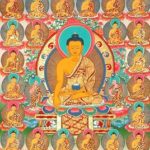Clean Your Karma
Karma is the law of cause and effect that determines what we experience in life. Every action that we do, positive or negative, has a similar consequence. In this way, our actions are like seeds that ripen in positive or negative circumstances and experiences. As ordinary beings, we have all acted in ways that we later regret. Some of us might even hold on to feelings of guilt or shame that bring us down and hinder our spiritual progress. Through powerful purification practices, we weed the gardens of our mind, refocus, motivate, and, with compassion for ourselves, spring ahead in the joyous cultivation of virtue. We take responsibility for our actions and empower ourselves for future success. Purification practices are grounded in the four opponent powers:
- Regret: This is not the same as guilt. Regret is acknowledging our mistake without beating ourselves up over it.
- Restoring the relationship: We cultivate constructive feelings towards those we have harmed.
- Resolving not to do the action again: Depending on the action, this can be for a manageable period of time or for the rest of our lives.
- Remedial action: Purification practices are among the most powerful remedial actions.
Regular purification practices help us to maintain our mindstreams free of karmic clutter, and practicing together as a group increases the energy and impact of these practices.
Time to clean house! Join us for a karmic cleansing!
Types of Practices
 Vajrasattva practice is one of the most popular and powerful in karmic housekeeping! Visualizing the purifying energy of the buddha Vajrasattva and reciting his hundred-syllable mantra, we pulverize the spiritual blockages of our past negativities, emerging clear, pure, and energized to move ever-forward on the path to ultimate success. Join us for this inspiring practice!
Vajrasattva practice is one of the most popular and powerful in karmic housekeeping! Visualizing the purifying energy of the buddha Vajrasattva and reciting his hundred-syllable mantra, we pulverize the spiritual blockages of our past negativities, emerging clear, pure, and energized to move ever-forward on the path to ultimate success. Join us for this inspiring practice!
 The Confession of Downfalls to the Thirty-Five Buddhas is also known as the Sutra of the Three Heaps because it is comprised of three parts: recognizing and taking responsibility for the mistakes we’ve made, rejoicing in our own and others’ good actions, and dedicating merit.
The Confession of Downfalls to the Thirty-Five Buddhas is also known as the Sutra of the Three Heaps because it is comprised of three parts: recognizing and taking responsibility for the mistakes we’ve made, rejoicing in our own and others’ good actions, and dedicating merit.
We visualize the 35 Confession Buddhas and eight Medicine Buddhas emanating from the heart of Shakyamuni Buddha. Taking inspiration from their compassion, we offer prostrations while reciting their names. We meditate on the infinite good qualities of all these buddhas whom we seek to emulate. In doing so, we reconnect with our own inner goodness and joyfully emerge from this inspiring practice with our hearts and minds cleansed and energized to move ahead in our lives.
In this transformative practice, prostrations may be offered physically or mentally. It has been said by Kyabje Lama Zopa Rinpoche that the real power of the practice comes from the sincere repetition of the names of the Confession Buddhas, so we need not hesitate to participate because of any physical challenges that we may have. All are welcome in this powerful practice!


